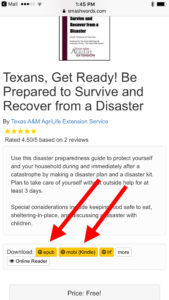
These disaster preparedness and recovery eBooks provide simple information on how individuals, families and businesses can prepare for and recover from a disaster such as a wildfire, hurricane, severe weather and more.
To download these eBooks to your mobile device before a disaster happens, click the yellow ePub or Mobi buttons on the corresponding links below. See the image to the right for the location of these buttons.
Texans, Get Ready! Be Prepared to Survive and Recover from a Disaster
Use this disaster preparedness guide to protect yourself and your household during and immediately after a catastrophe by making a disaster plan and a disaster kit. Plan to take care of yourself without outside help for at least 3 days.
After a Disaster – Information to Help You and Your Family Recover
Comprehensive disaster recovery guide that provides simple information on how individuals, families and businesses can recover from a disaster such as a wildfire, hurricane, severe weather and more.
Después de un Desastre
Guía de recuperación de desastres que ofrece información sencilla sobre cómo los individuos, las familias y las empresas pueden recuperarse de un desastre como un incendio, un huracán, el mal tiempo y mucho más.
Preparing Your Evacuation “Grab and Go” Box
Recent natural disasters have emphasized the importance of emergency preparedness. Everyone should have individual and family evacuation plans in place. It is critical that each family have a planned evacuation arrangement and an evacuation “to-go” box ready for emergencies.
Emergency Food and Water Supplies
Safe food and water supplies are a major concern following a natural disaster such as a tornado, flood, hurricane or blizzard. Families who live in disaster-prone areas may benefit from being prepared in the event of disaster. Knowing how to safely handle food and water in the immediate few days after the disaster can reduce stress, worry and inconvenience.
Handling Food and Drinks When Losing Power
This brief guide explains what is OK to eat or refreeze and what should be thrown out after loss of power to the home. Do not rely on taste or smell to decide if something is safe to eat!
Disinfecting Water After a Disaster
After a disaster such as a hurricane or flood, your water supplies may have become contaminated or been temporarily cut off. This guide briefly explains how to disinfect water using household chemicals, how to find water in and around your home, and how to store water safely. Listen to and follow public announcements from your local authorities.
Tree Care Kit
Learn how to improve urban tree health, position urban trees to better withstand severe weather (hurricane, ice storms, drought), and minimize damage and loss of not only the beloved trees, but also surrounding structures (homes, vehicles, power lines, etc.) — Be Tree Wise. Protect Life and Limbs.
Whooping Cough ( Pertussis )
Whooping cough, which is also known as Pertussis, is a highly contagious respiratory infection caused by a bacteria. Whooping cough is a very serious disease and can cause permanent disability and even death to infants.
Protection of Rangeland and Pastures from Wildfire
Grazing lands are subject to wildfire because of an abundance of fine fuel (grass), frequent dry conditions, and proximity to an ignition source -usually a road or highway. Due to the risk of Wildfire, rangelands and pastures must be protected from accidental fires and/or those that are intentionally set. Firebreaks are a necessary and useful tool in this regard.
After a Wildfire: Checklist of Considerations for Post-Fire Management
Comprehensive disaster recovery guide that provides simple information on how individuals, families and businesses can recover from a disaster such as a wildfire, hurricane, severe weather and more.
Hurricane Preparedness for Livestock Producers
With the right preparation you can protect your livestock from injury should a hurricane occur. This eBook briefly covers vaccinations, barn preparation, livestock evacuations, feed, hay and water storage.
Care and Treatment of Livestock After a Hurricane
Hurricanes can put livestock in immediate danger of drowning from flooding caused by heavy rains or storm surges in low-lying areas. In addition, flying debris or collapsing buildings can injure animals. These recommendations are just a partial list of actions that livestock owners should be aware of in a post-hurricane event and do not cover several species-specific concerns.
Maintain Your Health During a Disaster
Emergency situations and disasters can take a toll on your health. Prepare for your health needs in advance by following these easy tips.
Disaster Recovery Services Available to You
When disaster strikes an area, the services that assist the population can be affected. Know what resources are available to you so you can recover from the adverse circumstances you are facing.
Prepare Your Grab-and-Go Kit
Make a grab-and-go kit so basic items can be accessed easily before a disaster strikes. You can use a backpack or suitcase to carry your kit. Gather the following items on the list to form your kit.
Manage Stress During a Disaster
Stress is a normal part of everyday life, but it can worsen when a disaster happens in your area. Increased stress can negatively affect preexisting health conditions. Learn to manage daily stress before a disaster occurs to reduce its impact on your health.
Organize Your Medication
Prepare in advance so you will have needed medications if your neighborhood is affected by a disaster.
Return to Normal After a Disaster
Returning to normal after a disaster may pose problems for you and your family. Keep your health a priority.
